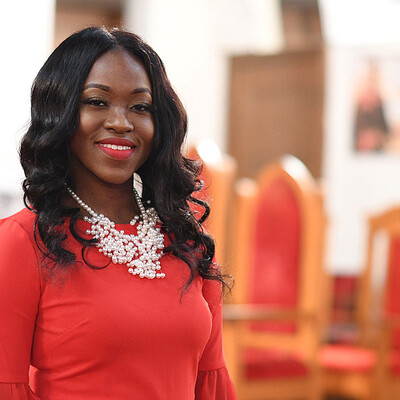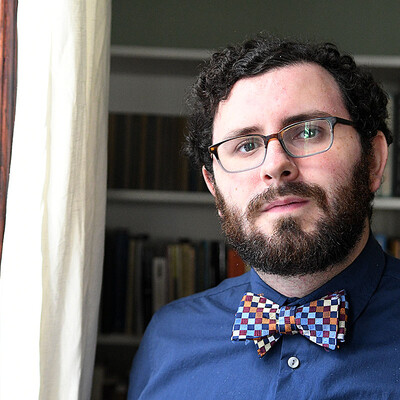Is chastity old-fashioned? An NFL veteran’s take on Seventh Commandment.
Loading...
| Philadelphia
Vai Sikahema is a familiar face in Philadelphia. He became a football hero after his 1992 touchdown punt return for the Eagles. These days, he’s an anchor for the morning news at Philly’s NBC affiliate, NBC10.
But within his church – The Church of Jesus Christ of Latter-day Saints – he’s known for his leadership. He currently presides over all spiritual and temporal aspects of his growing faith community in Pennsylvania, Delaware, and much of the surrounding region.
Why We Wrote This
Vai Sikahema, a TV anchor and former NFL player, has seen benefits to observing chastity and fidelity. Part 8 in a series looking at the Ten Commandments through modern lives.
Both in his own life and in that faith community, the Seventh Commandment – “Thou shalt not commit adultery” – figures prominently. Mr. Sikahema discussed this commandment with the Monitor as part of our series examining how ancient religious principles continue to matter in today’s world.
Mr. Sikahema says he’s followed the commandment in his own life – refraining from temptation while in the NFL, remaining a virgin until his wedding day, and staying faithful to his wife. They’ve been married for 35 years.
He sees the commandment as a blessing – for example, he says, by bringing security to his family. “I think God gives us these Commandments so we could be happy,” he says.
TV anchor Vai Sikahema, a gracious man, revels in his NFL locker room days – the banter, the teasing, the freewheeling maleness of it all. And why shouldn’t he? Mr. Sikahema’s 1992 touchdown punt return for the Eagles against the loathed rival New York Giants – polished off by his celebratory, Rocky-like punching of the opponents’ goal post – earned him legendary status in this city, which lives for its sports moments.
His teammates, though, also knew him as the guy who’d decline the strip club outings, and the attentions of pretty, hovering girls. “When you play professional sports, it has a tendency to force you off the fence” in terms of morality, he says. “I know I was unique in an NFL locker room: I was a virgin until my wedding day, and I was further unique in that I remained faithful to my wife through my football career and in my life.”
His commitment to fidelity continues today, despite being immersed, for the past 25 years, in a television news world as replete as the NFL with the “combustible elements” of celebrity, money, and opportunity. “The odd thing is, I never felt holier-than-thou,” even with his teammates, many of whom held far different values. “They’d keep me from getting hurt on Sundays,” he says.
Why We Wrote This
Vai Sikahema, a TV anchor and former NFL player, has seen benefits to observing chastity and fidelity. Part 8 in a series looking at the Ten Commandments through modern lives.
The doctrine of the church in which he was raised – The Church of Jesus Christ of Latter-day Saints – is simple, he says: “You don’t have sex until marriage, and in marriage you practice fidelity.” He has found this doctrine to be a great blessing in his life.
Mr. Sikahema spoke with the Monitor about the Seventh Commandment – Thou shalt not commit adultery (Exodus 20:14) – as part of our Ten Commandments series, which examines how ancient religious principles continue to matter in today’s world. “I think God gives us these Commandments so we could be happy,” he says.
Mr. Sikahema, originally from the South Pacific island nation of Tonga, immigrated to the United States with his parents when he was 7. His mother taught him not just to respect women’s sexuality, but to honor them, including in simple ways like opening a car door for them or carrying their packages. At first, Mr. Sikahema kept his virginity out of respect for his mother. With time, he recalls, “I grew into the doctrine and I understood, as I got older, its purpose.”
His church believes that sexuality has particular meaning in the eyes of God – that God shares the power of procreation with humans, and that this precludes trifling with aspects of life connected with that power. “When we violate the commandment we stand in contempt, and frankly, so many of the world’s ills result,” he says, noting especially the challenges that can arise when children grow up without fathers: “When people stray from their vows, it creates problems raising children.”
Security for the family
Today, the middle-aged father of four experiences benefits of the commandment that he did not foresee in his NFL days. “Once I had kids, and three of the four were sons, it occurred to me that among the blessings of honoring that commandment was that my children would grow up with the security that can only come from knowing that their father loves their mother in the most sacred way,” he says. This stood in contrast to the family chaos they often encountered in football and in society more widely. “I did not anticipate how powerful that is to children,” he says.
He likened his role to that of a teacher. “There is power, in whatever subject you teach, when you have the credibility and the conviction that comes from doing exactly what you teach,” he says. He saw it as his duty to teach chastity not just for his children’s physical well-being, but because of its emotional and spiritual power, which he believes results in the respect of self and others.
Today, three of his children are married, with six children among them. “One of the great, great blessings that have come from living the commandment,” he says, “is seeing our children in good, happy marriages.” He adds that if he had the choice to leave his kids either a billion-dollar inheritance or the legacy of faithfulness, there would be no contest. “Ultimately [my example] is of greater value to them,” he says.
“I feel like every day I get to work with him is like a gift,” says Rosemary Connors, a good friend of Mr. Sikahema who is a co-anchor, along with him, of the morning news at Philadelphia’s NBC affiliate, NBC10. Marriage is a frequent topic of conversation for the two – she a relative neophyte married only four years, he a generation older, with a perspective and sense of humor that helps her see past the bumps. Both people of faith, they view life and marriage through a spiritual lens, and Ms. Connors – admiring her co-worker’s manner of speaking of his spouse with respect and gratitude – takes that as a lesson. “I internalize that in my own relationship,” she says.
Married for 35 years
Mr. Sikahema and his wife, Keala, met while they were students at Brigham Young University, and they’ve been married for 35 years. “We both enjoy the blessings of a happy marriage because we decided from the beginning to not put ourselves in a compromising situation,” says Ms. Sikahema, who adds that her husband’s career has provided him many more opportunities than she has had to put the promise to the test. “He overcompensates and goes out of his way to do things out of the ordinary” to avoid even the appearance of infidelity. She recalls a road trip when he called for a cab rather than remain in a situation that had the feel of a double date.
“We try to remember to tell each other every morning that we will not take each other for granted,” she says.
While Mr. Sikahema’s public persona is that of Philly football hero and TV anchor, he’s known within his church for his leadership, he says, as he takes in the city from the sleek 12th-floor news headquarters at the year-old Comcast Technology Center. He currently presides over all spiritual and temporal aspects of his growing faith community in Pennsylvania, Delaware, and much of the surrounding region.
The Seventh Commandment figures prominently in that community’s life, but transgressions occur, he concedes. “Even the best people make mistakes,” he says. When that happens, the church offers a process for forgiveness of adultery, in recognition of the belief that Jesus gave his life in atonement for sins, including these kinds of sins. “What was once scarlet can be made as white as snow,” he says, referring to Scripture (Isaiah 1:18).
If a spouse has been unfaithful, the church expects both partners to consult with their bishop with the aim of repairing the marriage, a process that in some cases can take years. Mr. Sikahema is formerly a bishop on the receiving end of such requests.
“By and large, people give up on their marriages too soon,” he believes.
Travel companions
The Sikahemas, now empty nesters, travel together nearly every weekend throughout the Northeast for church business, driving if the destination is less than five hours away, flying if longer. “We just enjoy being together,” Mr. Sikahema says.
They pray on their knees together in the morning – at 3:30 a.m. on days when he needs to leave for the station – and again at night. They pray about the myriad hopes and needs of their family – now 15 strong – their church, and their world.
“I like old-fashioned,” says the newsman, who is not afraid to bring his Sunday school game to a hookup culture. Though other believers – be they Christian, Jewish, or Muslim – share the values of the Seventh Commandment, people need not be religious to benefit from the commandment’s take on matters of the heart, he says. “These values are more and more not in the mainstream, but I think reasonable people want this. Old-fashioned is good.”
Part 1: The Commandments as a moral source code in modern life
Part 2: How does the First Commandment fit in today?
Part 3: ‘I have to have humility’: How Second Commandment helped man find freedom
Part 4: One woman embraces Third Commandment in feeding 1,600 at Thanksgiving
Part 5: ‘Remember the sabbath’: How one family lives the Fourth Commandment
Part 6: ‘Growing up is hard’: How Fifth Commandment guided a child during divorce
Part 7: Is saying ‘I’d kill for those shoes’ OK? One woman and Sixth Commandment.
Part 8: Is chastity old-fashioned? An NFL veteran’s take on Seventh Commandment.
Part 9: ‘Thou shalt not steal’: Even someone else’s joy, says one educator
Part 10: ‘Thou shalt not bear false witness’: Ninth Commandment goes to Princeton
Part 11: Jealousy at Ivy League level: How a law professor views Tenth Commandment





















